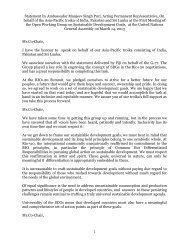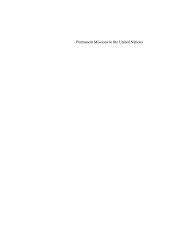statement by ambassador hs puri, permanent - Member States Portal
statement by ambassador hs puri, permanent - Member States Portal
statement by ambassador hs puri, permanent - Member States Portal
You also want an ePaper? Increase the reach of your titles
YUMPU automatically turns print PDFs into web optimized ePapers that Google loves.
STATEMENT BY AMBASSADOR H.S. PURI, PERMANENT<br />
REPRESENTATIVE OF INDIA ON PIRACY OFF THE COAST OF<br />
SOMALIA AT THE UN SECURITY COUNCIL ON JANUARY 25, 2011<br />
Thank you, Mr. President.<br />
I would also join others in thanking Mr Jack Lang, Secretary General’s Special<br />
Advisor on Legal issues and Assistant Secretary General Stephen Mathias for their<br />
comprehensive and useful briefings on the problems of piracy off the coast of<br />
Somalia. I would also like to thank the Representative of the Transitional Federal<br />
Government of Somalia for his perspective on the issue.<br />
2. Mr President, we have gone through Mr Lang's report on the legal issues<br />
relating to piracy off the coast of Somalia carefully. It is comprehensive and contains<br />
many useful recommendations. It draws our attention to the disturbing fact that<br />
Somali pirates are operating further and further off from the Somali coast. The shift<br />
of attacks to the south and east of the Indian Ocean reflects the pirates' ability to<br />
adapt in order to <strong>by</strong>pass the security corridor established <strong>by</strong> naval forces and to<br />
extend their reach to approximately 1000-1200 miles from Somali Coast. Piracy has<br />
also got more sophisticated and become an organised and lucrative activity.<br />
3. Indeed, as Mr Lang's report states, piracy is gradually becoming an organised<br />
industry. Pirates have developed significant support structures where<strong>by</strong> they are<br />
able to hold hijacked ships and crews hostage for mont<strong>hs</strong> while their instigators and<br />
supporters hold negotiations for ransom. It is particularly worrying that the pirates<br />
have developed a modus vivindi with terrorist organisations.<br />
4. Mr President, according to the International Maritime Bureau, a record<br />
number of people, 1181 sailors, were taken hostage <strong>by</strong> pirates worldwide in 2010,<br />
of which the Somali attacks account for 1,016 hostages. Currently, the Somali pirates<br />
are holding 28 ships with more than 638 crew on board. During the year 2010, 53<br />
ships were hijacked worldwide of which 49 were hijacked <strong>by</strong> Somali pirates.<br />
Compared to 2009, there was a 10 per cent increase in the number of pirate attacks<br />
in 2010, the total number being 445. Studies <strong>by</strong> different think tanks say that<br />
maritime piracy costs the global economy anywhere between $ 7 and 12 billion a<br />
year. Mr President, these figures are cause for a major concern for the international<br />
community.
5. The continuing instability in Somalia, Mr President, does not permit an<br />
effective response to the problem of piracy even though the Transitional Federal<br />
Government has identified counter-piracy as a major area of cooperation under the<br />
Kampala process. This process, therefore, needs to be revitalised and a major<br />
capacity building exercise needs to be undertaken in areas of security and police<br />
forces, legal and legislative frameworks, jurisdictional and correctional systems, etc.<br />
6. We are in agreement with the Special Advisor of the Secretary General on the<br />
need to further strengthen international cooperation to tackle the problem of piracy.<br />
A comprehensive approach to tackle the problem has to be found to address this<br />
serious issue. In this context, my delegation wishes to propose the following<br />
measures:<br />
o Reinforcement of tracking the trail of ransom money to different parts<br />
of the world, as was entrusted to the Interpol in the 6th CGPCS;<br />
o Prosecution of the beneficiaries of ransom money for abetting piracy;<br />
o Consideration of the conduct of the naval operations under the UN as<br />
the preferred option;<br />
o Sanitization of the Somali coast line through identified corridors and<br />
buffer zones and tracking of fishing vessels around the Somali coast;<br />
o Enactment of national laws on priority to criminalize piracy as<br />
defined in the UN Convention on the Law of the Sea and the<br />
prosecution of suspected, and imprisonment of convicted, pirates<br />
apprehended off the coast of Somalia as required under resolution<br />
1918 (2010)<br />
7. As a country with a coastline of over 7,500 kilometres, criminal activities in<br />
the international waters pose a serious threat to India. A large volume of India's<br />
trade passes through the Gulf of Aden, estimated at about US$ 110 billion annually.<br />
About 24 Indian-flagged merchant ships transit the Gulf of Aden every month.<br />
Moreover, more than 6 percent of seafarers engaged in international shipping<br />
companies are Indian nationals. We, therefore, have a strong interest in ensuring the<br />
security of maritime traffic off the Somali coast, the Gulf of Aden and the Arabian<br />
Sea.<br />
8. India has been actively engaged in anti-piracy operations. The Indian Navy<br />
commenced anti-piracy patrols in the Gulf of Aden from October 2008. A total of 23<br />
Indian Navy ships have been deployed in the Gulf of Aden since then. In addition to<br />
escorting Indian flagged vessels, ships of other countries have also been provided<br />
protection. A total of 1487 ships, including 1321 foreign flagged vessels from<br />
different countries, have been escorted <strong>by</strong> Indian Navy ships in the Gulf of Aden
since October 2008. 26 piracy attempts have been thwarted and no ship under<br />
Indian escort has been hijacked <strong>by</strong> pirates. We have also set up a 24x7<br />
Communication Centre within the Indian Maritime Administration for coordination<br />
and facilitation in case of piracy. Taking serious note of recent spate in "Dhow<br />
Piracy", India has banned operation of Indian Dhows in piracy infested areas. As the<br />
piracy prone area has expanded eastwards, the Indian Navy has made additional<br />
deployments off Eastern and North Eastern Arabian Sea. Indian Navy has also<br />
deployed units to EEZ of Seychelles and Mauritius and its ships and aircrafts<br />
routinely patrol the waters off the Maldives. Following these deployments, there<br />
have been no hijack incidents in the east Arabian Sea since December 2010<br />
consequent to one or two stray incidents that were suddenly experienced for a very<br />
brief period in end-November 2010.<br />
9. India, as a founder-member of the 'Contact Group on Piracy off the Coast of<br />
Somalia' (CGPCS), has been fully engaged in the efforts of the group to share<br />
information, coordinate actions of navies in combating piracy in the Gulf of Aden,<br />
raising public and merchant marine awareness and, examining legal and criminal<br />
justice issues with respect to apprehended pirates. Further, the Indian Navy has<br />
proactively cooperated with other navies through the SHADE (Shared Awareness<br />
and De-confliction) mechanism and otherwise.<br />
Mr. President,<br />
10. India would continue to contribute to international efforts aimed at<br />
increasing effective cooperation among <strong>States</strong> to tackle the problems of piracy. We<br />
also propose to actively engage in this Council's work in the follow through of the<br />
recommendations made <strong>by</strong> the Secretary General's Special Advisor and in ensuring<br />
the development of effective operational, legal and institutional response to the<br />
problems of piracy.<br />
Thank you, Mr. President.<br />
BACK TO SECURITY COUNCIL


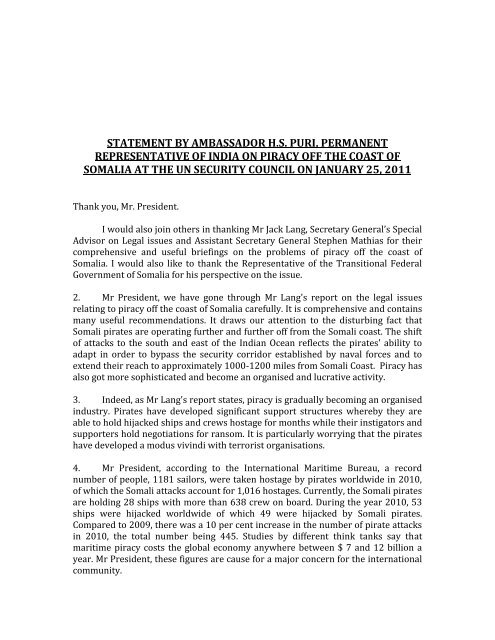
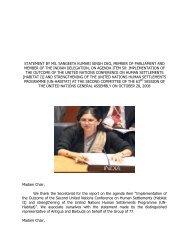
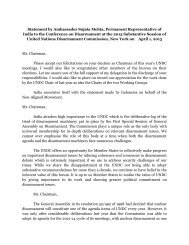
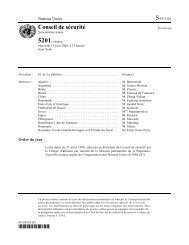
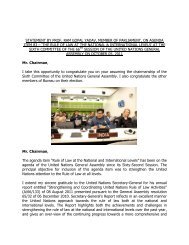
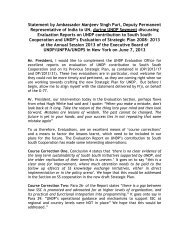
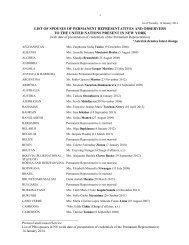
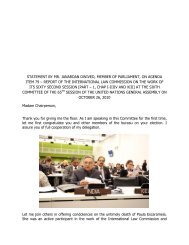
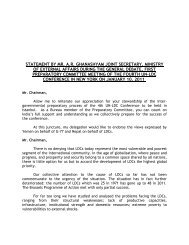
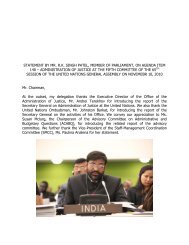
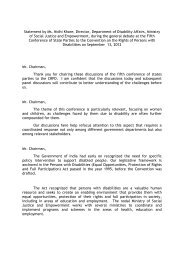
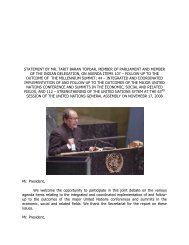
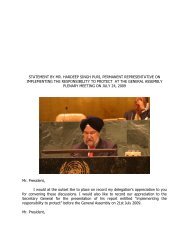
![1 statement by dr.[mrs] kakoli ghosh dastidar - Member States Portal](https://img.yumpu.com/27526598/1/190x245/1-statement-by-drmrs-kakoli-ghosh-dastidar-member-states-portal.jpg?quality=85)
